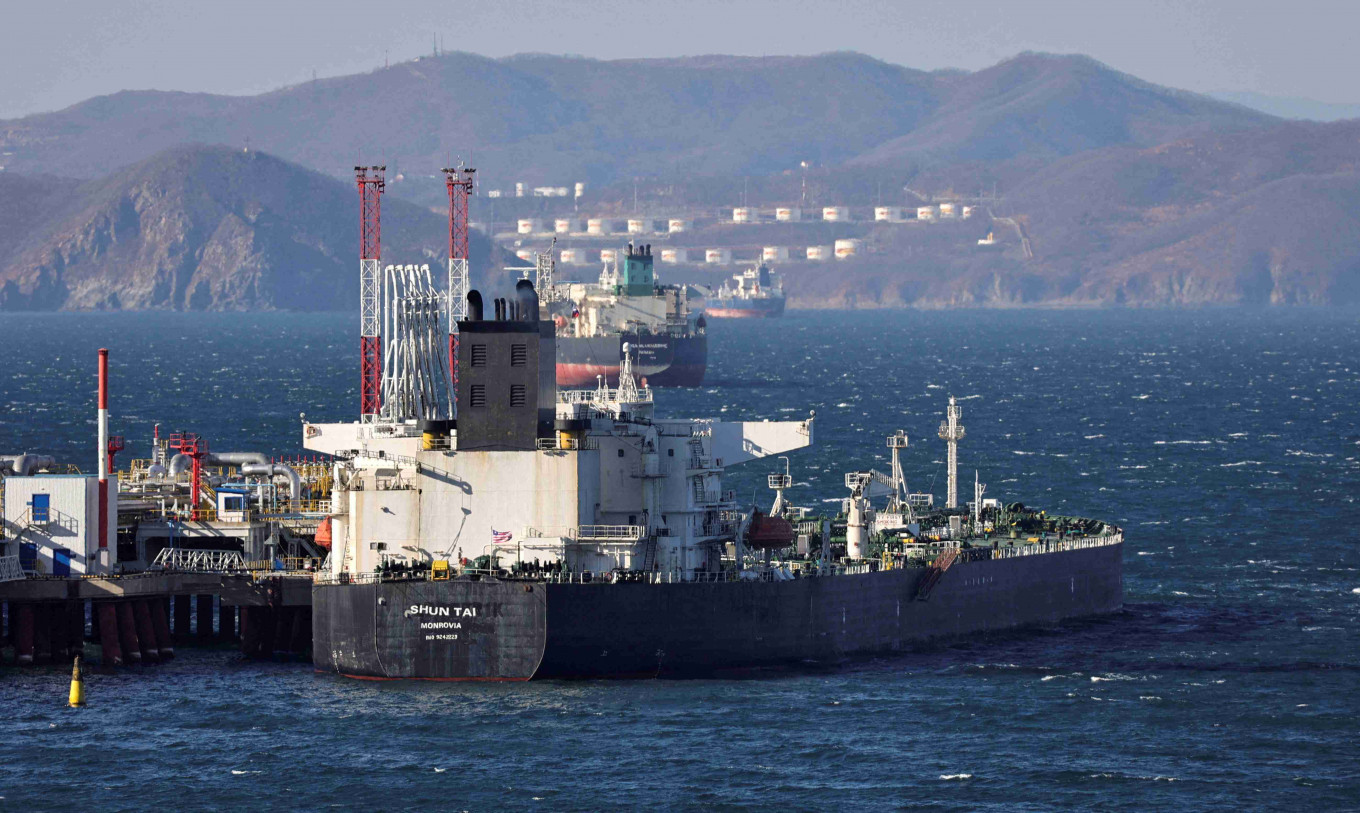Popular Reads
Top Results
Can't find what you're looking for?
View all search resultsPopular Reads
Top Results
Can't find what you're looking for?
View all search resultsGrowing tanker fleet, cheaper freight challenge Russian oil price cap
The arrival of new shippers working outside the purview of Western governments allows Russian firms to earn more than the $60 per barrel cap that the US and its allies had aimed to impose on Russia through sanctions.
Change text size
Gift Premium Articles
to Anyone
R
ussian crude oil producers are enjoying the cheapest costs to ship to refiners in China and India in almost a year thanks to a growing number of vessels plying the routes, according to trading and shipping sources.
The arrival of new shippers working outside the purview of Western governments allows Russian firms to earn more than the $60 per barrel cap that the US and its allies had aimed to impose on Russia through sanctions. It also means that enforcing the price cap will have a limited impact on Russian revenues.
On Thursday, the US imposed the first sanctions on owners of tankers carrying Russian oil above the cap, one based in Turkey and one in the United Arab Emirates, in an effort to close loopholes on the mechanism designed to punish Moscow for the war in Ukraine.
The Group of Seven (G7) countries imposed sanctions in December 2022 that prohibit shippers or insurers domiciled in member countries from offering services to facilitate Russian oil exports when the price is above $60 a barrel. The sanctions do not apply to shipping companies or insurers from other countries, regardless of the price.
When the sanctions were imposed, most of the ship owners and vessels involved in the trade were Western. Had the oil price been above $60 at the time, sanctions would have severely disrupted Russian exports. However, the price for most Russian oil only rose above $60 in July, which meant traders, shipping companies and Russian exporters had months to prepare.
During that time, traders willing to work the routes snapped up older tankers and others were re-registered in countries that were not imposing sanctions.
The number of tankers that are part of a so-called shadow fleet is estimated to number 535 ships with an average age of 23 years, according to analysis from maritime platform Lloyd's List Intelligence, adding that two-thirds of these tankers have no known insurance cover.
"As long as governments understandably make use of financial and technical services and shipping as a foreign policy tool to try and control trade, then there will be those people who will position themselves out of reach of those laws and carry on their trade," Mike Salthouse, head of external affairs with leading ship insurer North Standard, told Reuters.
So many vessels are willing to sail loaded with Russian oil that freight rates have fallen - effectively handing Russian producers even more revenues. Sellers of Russian Urals crude are saving about $7 per barrel on freight rates this autumn compared with last winter shortly after the price cap was imposed, according to traders and Reuters calculations.
That means exporters are earning about $70 a barrel for oil loaded at Baltic ports, according to Reuters calculations, well above the $60 price cap.
When oil prices were in September at their peak this year of $97 per barrel, Russian exporters were earning as much as $79 per barrel.
Freight rates for Russian Urals crude shipments to Asia for October cargoes plunged to the lowest levels since the implementation of the price cap, traders said.
The cost of a 100,000-tonne tanker journey from Baltic ports to India fell to $4.8 million-5.2 million (about $7 per barrel) for October-loading barrels, traders said, from more than $15 million (some $14 per barrel) in early 2023 after the price cap policy was introduced.
Freight rates have also fallen after Russia agreed to reduce oil exports by 300,000 barrels per day (bpd) in tandem with OPEC+ ally Saudi Arabia.
Still, Russia has been exporting nearly 5 million bpd of crude oil this year. The International Energy Agency said on Thursday overall Russian oil and fuel exports have jumped to 7.6 million bpd in September.
Transportation costs for a 140,000-tonne Urals cargo from Russia's Black Sea port of Novorossiysk to India averaged some $4.1 million-4.2 million per voyage in October, shipping and trading sources said, down from about $5 million during summer months.
Shipping entities registered in the Middle East, Africa, China, Latin America and even Russia are working the routes, traders said.
"We see several new names in shipping with tanker fleets," another trader added.
Western officials argue that the price cap is working even though Russian oil producers are able to sell at above $60 a barrel, because Russian oil is still selling at below the rate it would have done without the sanctions because it has less customers for its oil and fewer service providers.
Another key concern for the US and other governments when they imposed the sanctions was to prevent disruptions in global oil supplies that would have driven oil prices even higher.
"If Russia wants to go completely outside the G7 system to move oil above the cap, they can do that,” Claire McCleskey, assistant director for compliance with the US Treasury's sanctions enforcement arm OFAC, said at a Capital Link shipping conference in London on Sept. 12.
"It's a prohibition on our service providers. That being said, that doesn't mean that we're totally blind to the safety concerns".










